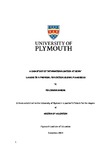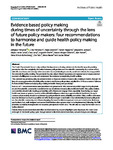What place has grammar in the English curriculum? An analysis of ninety years’ policy debate: 1921 to 2011.
| dc.contributor.supervisor | Seale, J | |
| dc.contributor.author | Norman, Phillip Richard | |
| dc.contributor.other | Plymouth Institute of Education | en_US |
| dc.date.accessioned | 2012-08-31T06:55:16Z | |
| dc.date.available | 2012-08-31T06:55:16Z | |
| dc.date.issued | 2012 | |
| dc.identifier | 321751 | en_US |
| dc.identifier.uri | http://hdl.handle.net/10026.1/1180 | |
| dc.description.abstract |
Since 1921 England’s governments have commissioned enquiries into English and literacy teaching, leading towards published recommendations and requirements for English grammar teaching. Governments’ officially sanctioned publications represent their policy aspirations for English and literacy. Research studies have explored the subsequent challenge for schools and teachers who must integrate grammar into a subject whose wider philosophies may conflict with an explicit grammar element. My study draws on critical theory to analyse the ideological discourses of English grammar these official policy documents reveal, and how they conflict or coincide with wider ideologies of English and literacy in schools. My study uses a two-stage analysis. First is an intertextual analysis using a corpus approach to identify the data’s grammar topics through its keywords and argumentation types. Second is a qualitative critical discourse analysis (CDA) of the documents’ main ideas and ideological discourses. The CDA analysis reveals three main ideological discourses of grammar, namely of ‘heritage and authority’, ‘standards and control’, and ‘life chances and skills’. These discourses are constructed from both prescriptive and descriptive traditions of linguistic thinking, and draw on ideological perspectives of teaching and teachers, learning and learners, and changing philosophies of English over time. The findings show no direct connection between the topic keywords policy authors use and the ideological positions they adopt. But there is a clear trend in argumentation approaches used to make hoped-for claims for grammar’s place and benefits in subject English. The discourses found question whether teachers are sufficiently prepared for grammar teaching and whether learners are sufficiently prepared for communicating in the workplace. The policy ideologies of grammar found in the qualitative analysis are finally re-mapped against wider philosophies of subject English to identify the broad policy trends. | en_US |
| dc.language.iso | en | en_US |
| dc.publisher | University of Plymouth | en_US |
| dc.subject | English | en_US |
| dc.subject | grammar | en_US |
| dc.subject | Curriculum | en_US |
| dc.subject | critical theory | en_US |
| dc.subject | language education | en_US |
| dc.subject | curriculum policy | en_US |
| dc.subject | curriculum policy analysis | en_US |
| dc.subject | policy discourse | en_US |
| dc.subject | policy ideology | en_US |
| dc.subject | English curriculum | en_US |
| dc.title | What place has grammar in the English curriculum? An analysis of ninety years’ policy debate: 1921 to 2011. | en_US |
| dc.type | Thesis | en_US |
| plymouth.version | Full version | en_US |
| dc.identifier.doi | http://dx.doi.org/10.24382/1411 | |
| dc.identifier.doi | http://dx.doi.org/10.24382/1411 |
Files in this item
This item appears in the following Collection(s)
-
01 Research Theses Main Collection
Research Theses Main




